OCZ Vector 150 (120GB & 240GB) Review
by Kristian Vättö on November 7, 2013 9:00 AM EST- Posted in
- Storage
- SSDs
- OCZ
- Indilinx
- Vector 150
Random Read/Write Speed
The four corners of SSD performance are as follows: random read, random write, sequential read and sequential write speed. Random accesses are generally small in size, while sequential accesses tend to be larger and thus we have the four Iometer tests we use in all of our reviews.
Our first test writes 4KB in a completely random pattern over an 8GB space of the drive to simulate the sort of random access that you'd see on an OS drive (even this is more stressful than a normal desktop user would see). I perform three concurrent IOs and run the test for 3 minutes. The results reported are in average MB/s over the entire time. We use both standard pseudo randomly generated data for each write as well as fully random data to show you both the maximum and minimum performance offered by SandForce based drives in these tests. The average performance of SF drives will likely be somewhere in between the two values for each drive you see in the graphs. For an understanding of why this matters, read our original SandForce article.
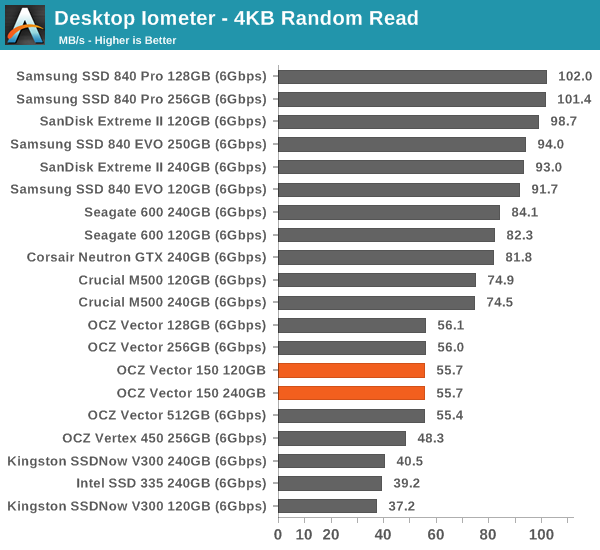
Random read performance remains unchanged but the Vector 150 wasn't supposed to bring any improvements to that anyway.
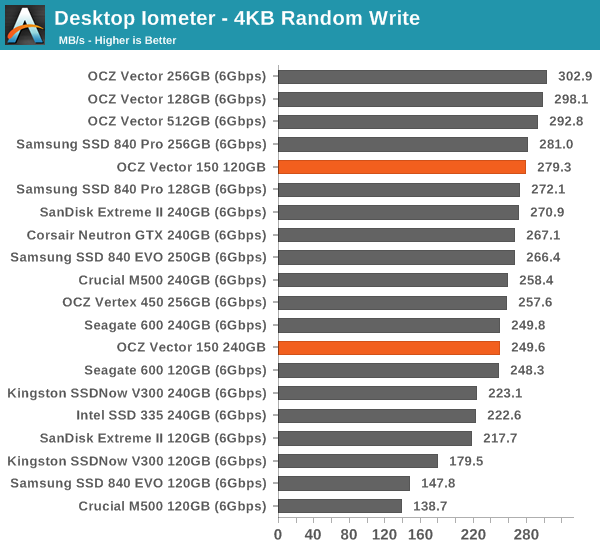
Random write speeds at queue depth of 3 take a hit, though I'm thinking this might be due to the new smaller process node NAND. When the queue depth is increased to 32, the performance is on-par with the original Vector thanks to parallelism.
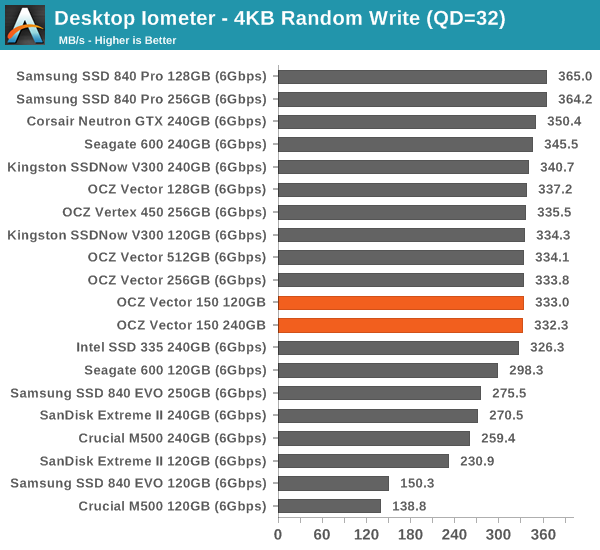
Sequential Read/Write Speed
To measure sequential performance I ran a 1 minute long 128KB sequential test over the entire span of the drive at a queue depth of 1. The results reported are in average MB/s over the entire test length.
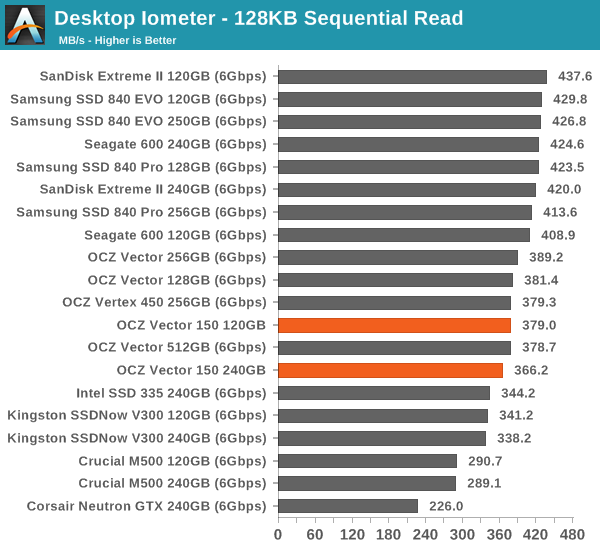
No surprises here either. Sequential performance has remained mostly the same for the last year or so and we won't see another bump until M.2 and other PCIe-based designs get more popular.
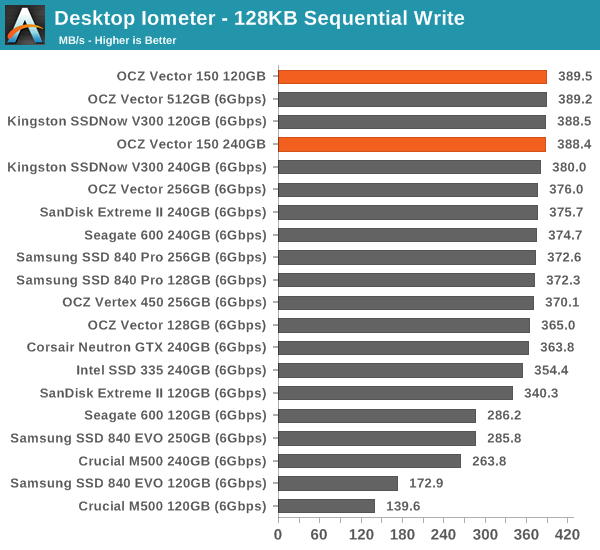
AS-SSD Incompressible Sequential Read/Write Performance
The AS-SSD sequential benchmark uses incompressible data for all of its transfers. The result is a pretty big reduction in sequential write speed on SandForce based controllers.
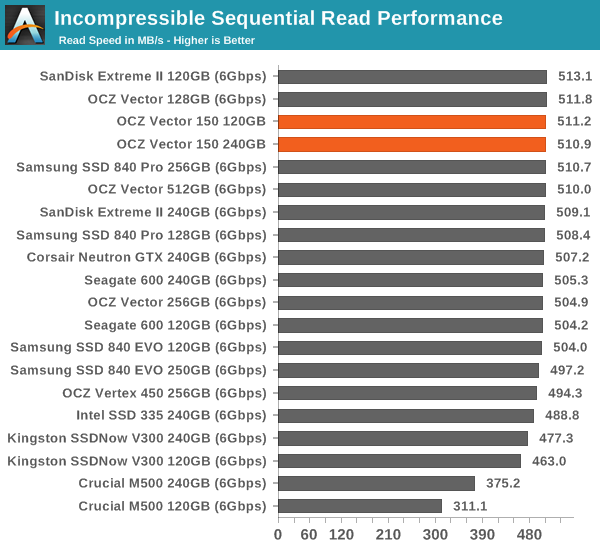
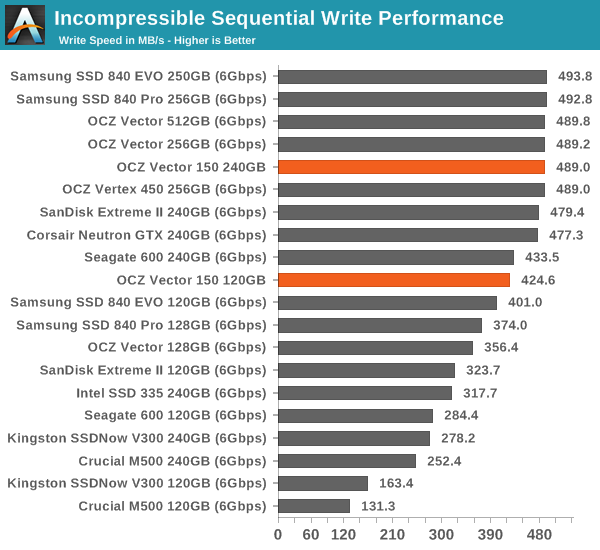










59 Comments
View All Comments
Kristian Vättö - Friday, November 8, 2013 - link
"The reason they haven't been bought is that the barefoot is just a rebadged marvell controller.they have no ip."The Octane and Vertex 4 used Marvell based silicon but the Barefoot 3 is OCZ's/Indilinx' own silicon. Or unless you have some proof that states otherwise.
JellyRoll - Friday, November 8, 2013 - link
The 'proof' is common sense. First, they have lied in the past, saying that the first Barefoots were from them, until a document was leaked, remember that?Second, every single company producing a good controller that is not owned by a fab or other large enterprise company has been bought in the last few years. The exception is OCZ. If they actually had a controller, someone else would have bought them. Doesn't it strike you as funny that this Barefoot also has the same "Aragon Co-Processor" as the controller that they admitted they were lying about, which was Marvel? If they lied once, what makes you think they wouldn't lie again? Wasnt it Anand that broke that story in the first place? The only difference is the leaker was found and fired.
blanarahul - Friday, November 29, 2013 - link
" Doesn't it strike you as funny that this Barefoot also has the same "Aragon Co-Processor" as the controller that they admitted they were lying about, which was Marvel? ".No. It doesn't. Vector was the first drive that used their so-called Aragon Processor.
Or may be you can find me a document/webpage as proof.
Anyway, I hope the Indilinx and PLX guys go to Toshiba. The rest of OCZ should go to Corsair.
JellyRoll - Thursday, November 7, 2013 - link
OCZ stock is worth 45cents a share, 3x lower value this week alone. By all observers from numerous sources in the market ocz is in a state of collapse. Readers should be warned, they will not be there to honor that rma.Shadowmaster625 - Thursday, November 7, 2013 - link
The irony of a dead OCZ review sample. Screw this company. I jsut had my 2nd to last OCZ drive die on me this week. It started with a failure to update java which lead to a failure of the windows installer. Finally it just died and the BIOS wouldnt even see the drive anymore. I have one more OCZ drive left, and I am sure it will die soon. Yes, every single OCZ drive that I have even bought has died.Stefanfj - Thursday, November 7, 2013 - link
That is really sad and unfortunate, I have an Agility3 60GB which I bought June 2011 (IIRC), still working perfectly in a friend's PC, I also have two Vertex4 128GB drives (seperate computers), as well as having sold two Vertex4 64GB drives to two other friends - they all working fine... Guess it really is just a big lottery maybe...clarkn0va - Thursday, November 7, 2013 - link
In my experience this depends entirely on which line you are buying. I have and use four or five Vertex and Agility series drives and I've sold dozens of others. I have yet to see a single one of them fail.By contrast, I bought and sold a handful of lower end OCZ drives, including the Petrol, Solid and Fuel, and the majority of these died in short time. I even had a RMA replacement die after about a month of light use. The last Petrol to fail was replaced by an Agility because thankfully OCZ had stopped shipping the Petrol.
So yeah, I stick to their top shelf SSDs and happily pocket the savings over the lower performing and more expensive Intel drives.
zodiacsoulmate - Thursday, November 7, 2013 - link
My Vector 256 GB died in 3 month, now I'm on my third replaced 256 GB drive...colonelclaw - Thursday, November 7, 2013 - link
I don't like kicking anyone when they're down, but I've heard rumours that OCZ have burnt through all their cash and are dangerously close to going bust. Does anyone know if this is true?marc1000 - Thursday, November 7, 2013 - link
Kristian, I was expecting to see the Intel SSD 530 in the comparison list. Do you have an ETA about testing it someday? Or is the performance too similar to SSD 335 to warrant a review?thanks